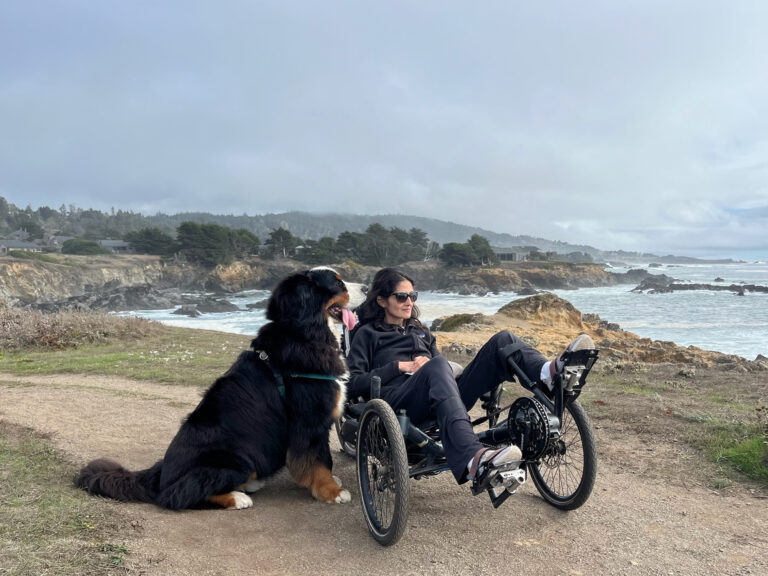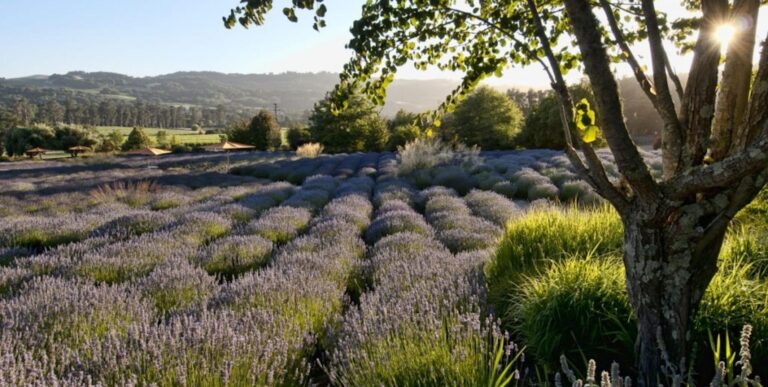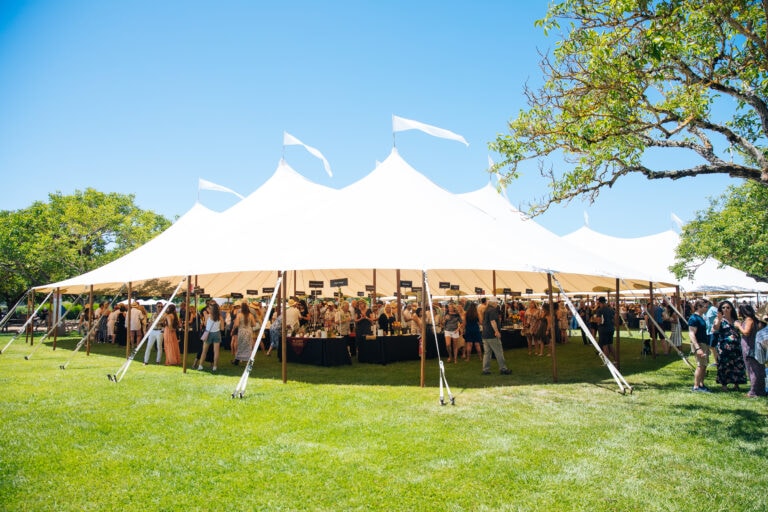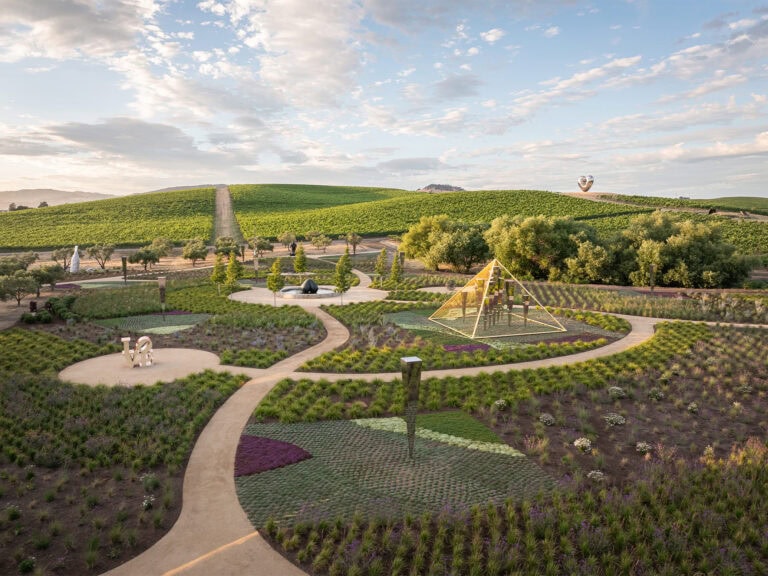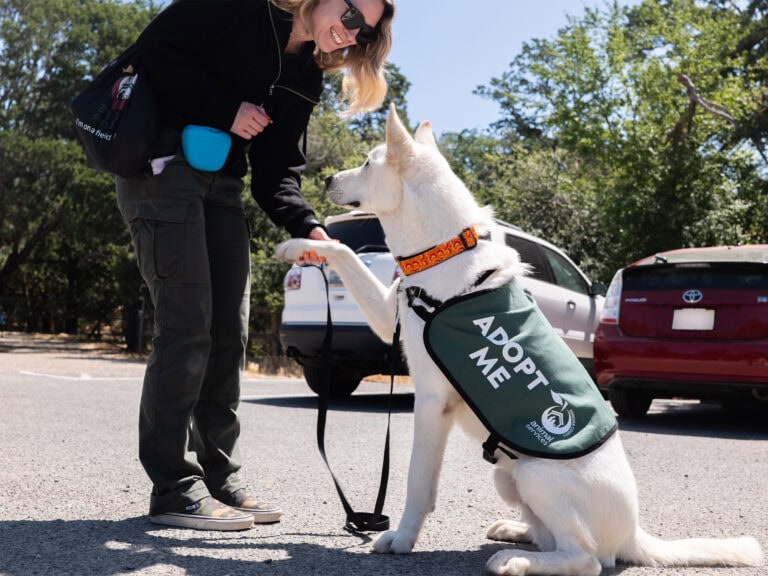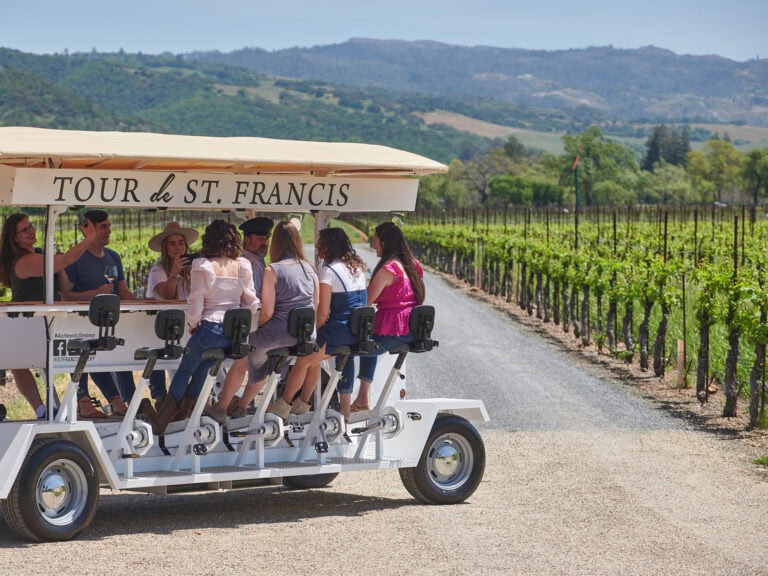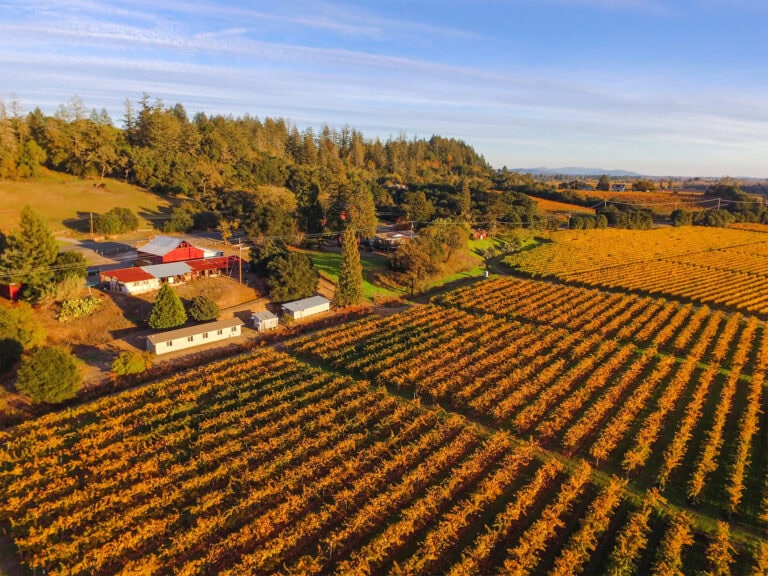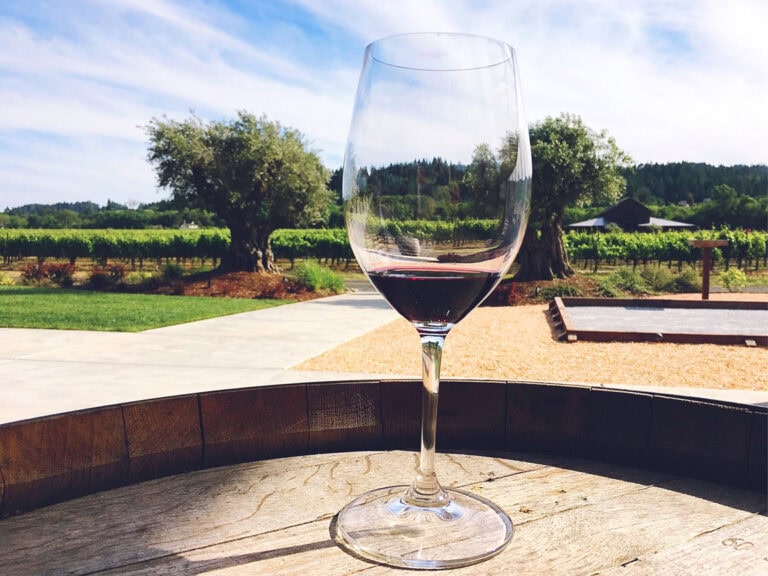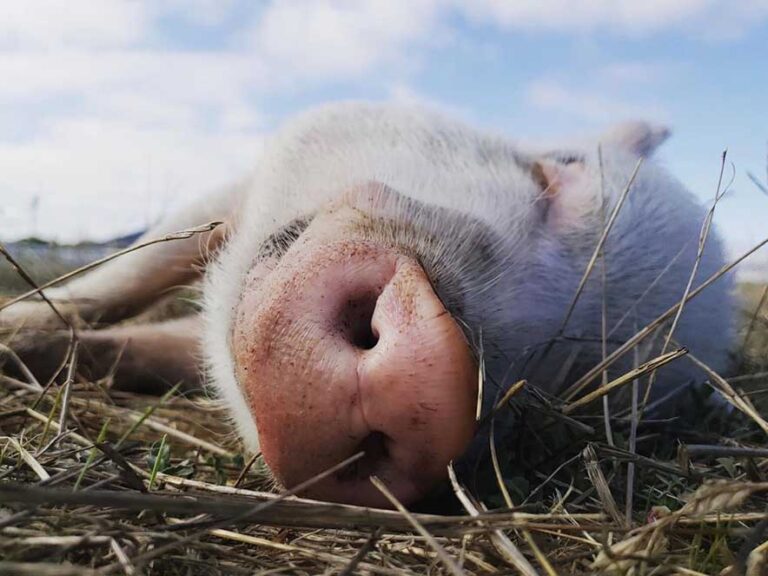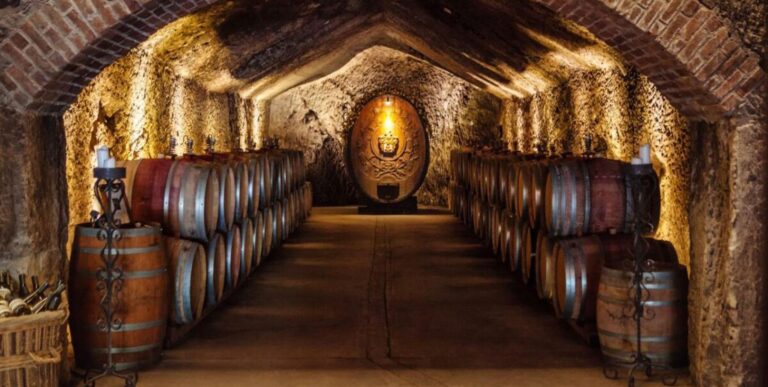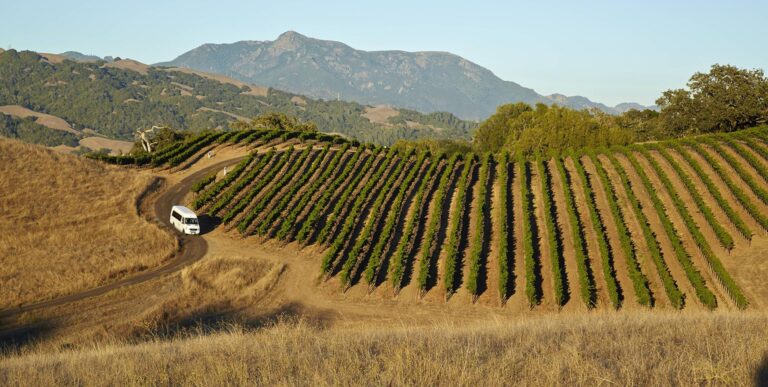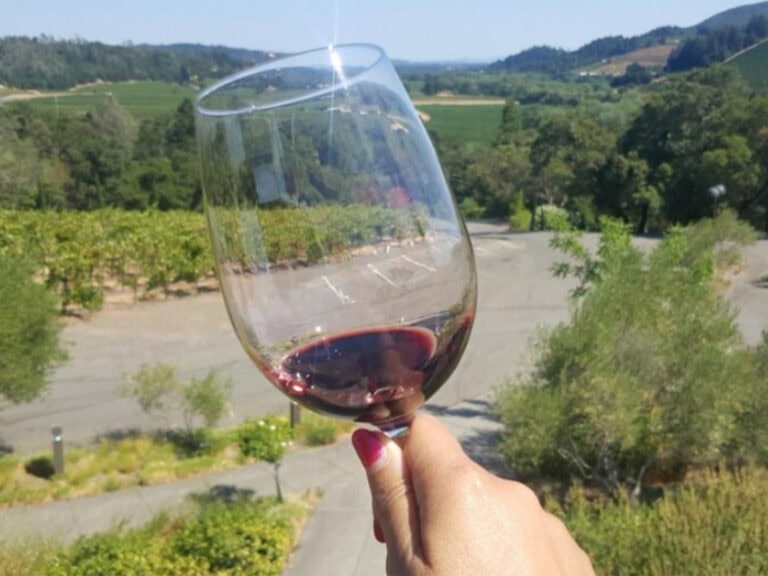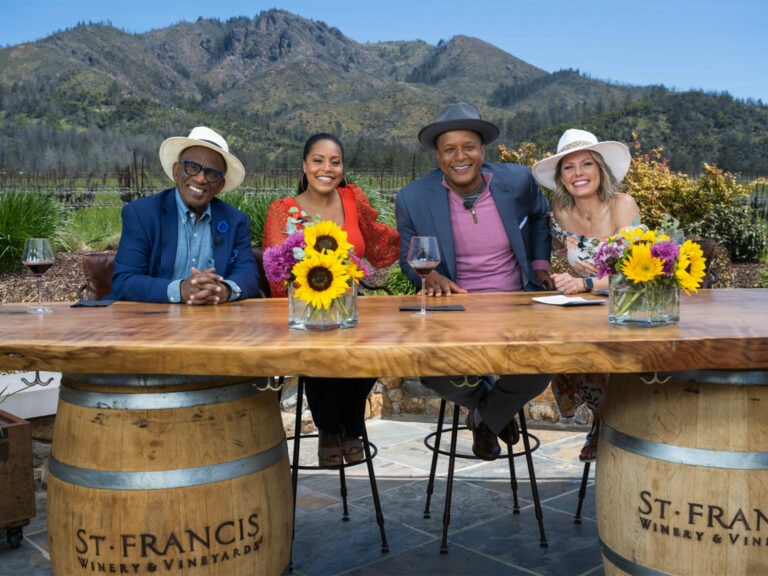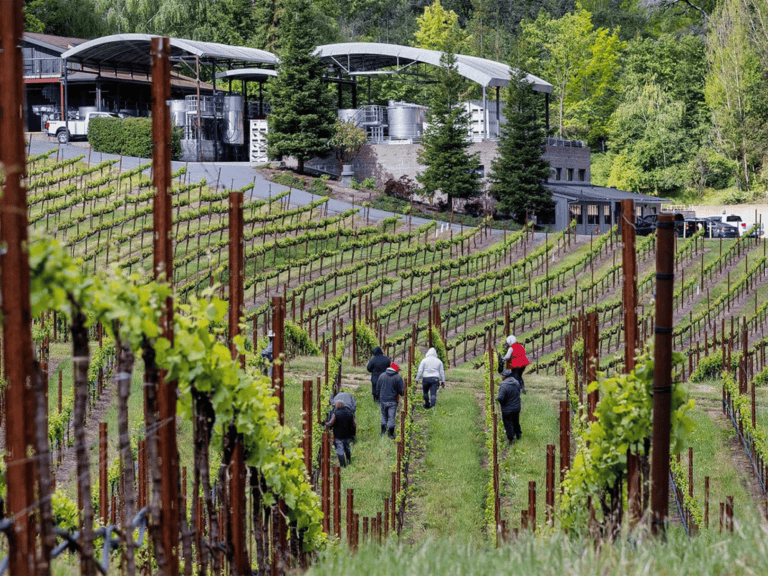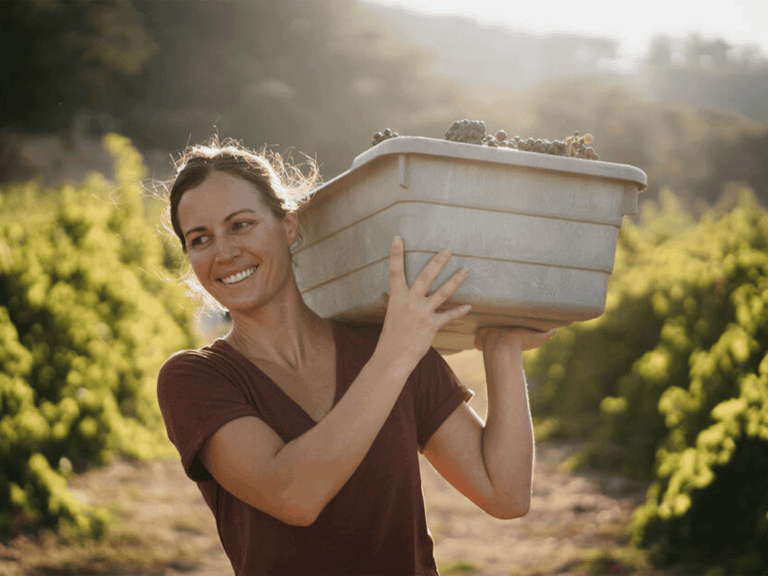Biodynamic & Organic Wineries in Sonoma County
Sonoma County has long been a center of agricultural innovation. For instance, author Jack London pioneered many of the principles of organic farming at his Sonoma Valley ranch (now Jack London State Historic Park), and horticulturist Luther Burbank‘s main goal was to increase the world’s food supply.
Today, the region continues to focus on eco-friendly farming methods — organic, biodynamic and sustainable — that improve a farm’s soil health, its resulting crop, and its surrounding environment.
Why Does Soil Health Matter?
Soil is the foundation of plant life, so its health largely determines the success of an agricultural system. Healthy soil contains a complex, biodiverse “soil web” of different organisms — such as earthworms, bacteria, fungi, and plant roots — that interact to create a carbon-rich environment in which plants can thrive.
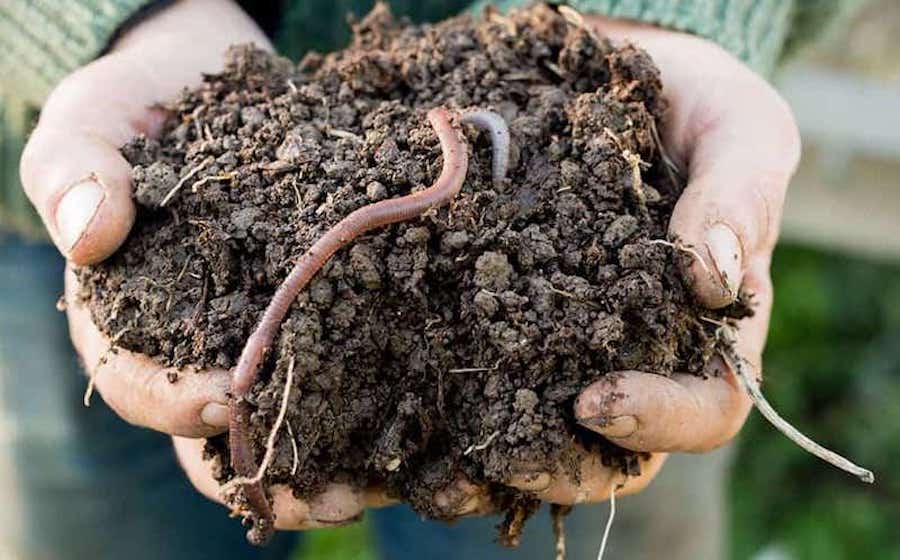
If the soil web is disturbed, its health can fall out of balance, inviting problems that range from plant diseases to soil nutrient depletion, land erosion, and water pollution.
How Do Sonoma County Farmers Make Their Soil Healthy?
The major ecologically sound farming methods used in Sonoma County — organic, biodynamic, and sustainable — differ in a few significant ways. However, all employ the same four farming practices to improve soil health by preserving its soil food web; letting organic matter accumulate; and reducing erosion and greenhouse gas emissions.
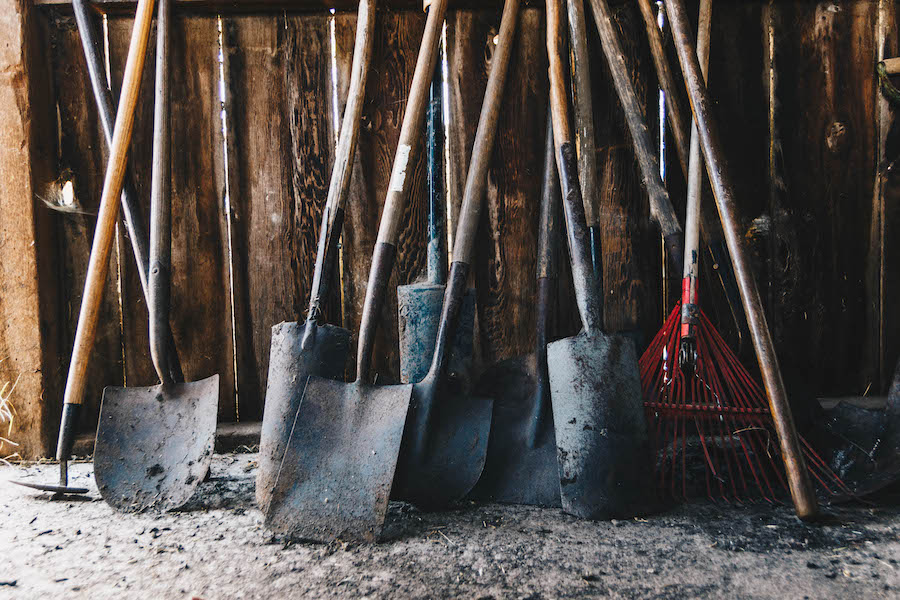
The four key ecological farming practices are:
No-till farming: “Till” is short for tillage (mechanical methods of plowing land, as with a tractor) which can seriously disrupt a soil’s web of organisms. Avoiding tillage is impractical for large-scale farms, so they instead rely on soil-web-friendly tractor attachments like tined weeders, chain harrows, and side-discharge spreaders.
Composting: This is the process of recycling green manure (food waste, fallen leaves, and garden cuttings) and animal manure by letting it decompose into a valuable fertilizer called compost. When the compost begins to look like dark brown soil, it’s added directly to the soil to boost its carbon content and nourish the soil web.
Crop rotation: This involves growing different types of cash crops (produce a farm sells for profit) in the same field, in rotation. As one cash crop is harvested, another is planted, keeping the soil consistently planted in order to boost carbon, keep soil aerated, and strengthen the soil web.
Planting cover crops: After harvesting a cash crop, a farmer will often plant the bare soil between rows with a temporary cover crop. Allowed to grow while the cash crop is dormant, this cover crop (e.g., clover, fava beans, and/or mustard) suppresses weeds and attracts beneficial insects, among other things. When the cash crop begins to grow again, the cover crop is mowed and its trimmings are left to decompose on the soil, nourishing it with nutrients like nitrogen.
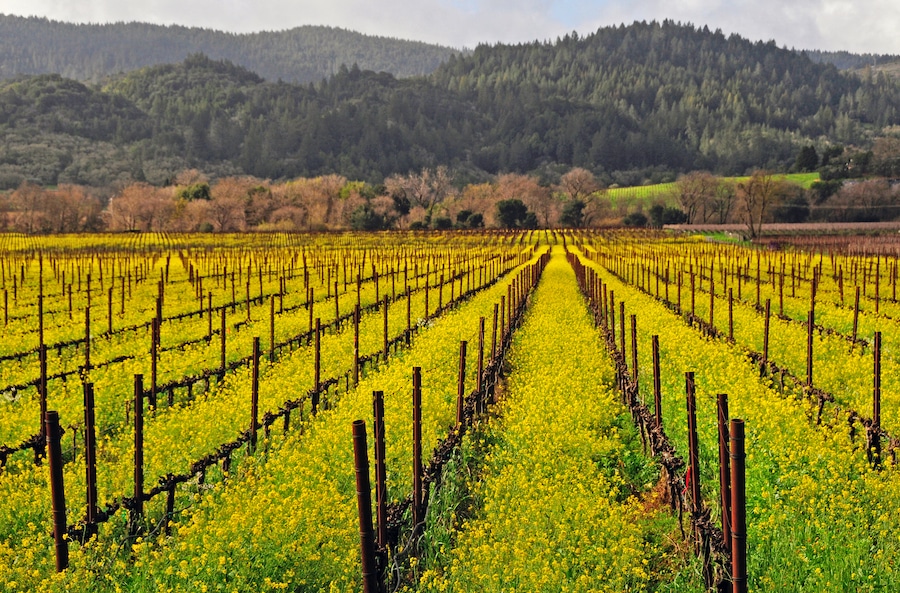
In Sonoma County, organic, biodynamic, and sustainable farming methods and certifications build upon these practices in order to ensure the future of local agriculture.
Organic Farming
First developed in reaction to environmental pollution caused by the U.S. agricultural industry’s heavy use of toxic fertilizers and pesticides in the first half of the 20th century, organic farming focuses mainly on the strict use of pure, natural products (e.g., composts and meals) derived from mineral, plant, or animal matter.
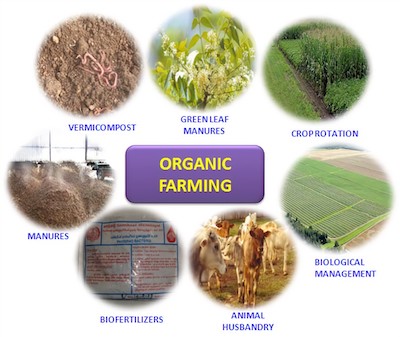 In switching to these natural products, the goal is to encourage biodiversity in the soil web, which will increase the soil’s carbon content and strengthen its ability to resist pests, diseases, and erosion, as well as capture and filter water.
In switching to these natural products, the goal is to encourage biodiversity in the soil web, which will increase the soil’s carbon content and strengthen its ability to resist pests, diseases, and erosion, as well as capture and filter water.
Other important practices of the organic system include animal husbandry, or raising/using livestock like sheep and chickens to eat and trample weeds, as well as for their nutrient-rich manure; and (especially important in Sonoma County’s dry Mediterranean climate) the careful conservation of water.
Organic Certification
 California has long been the national vanguard of this agricultural movement, as the first organic certification entity in the U.S. — California Certified Organic Farmers (CCOF) — was founded in Santa Cruz in 1973.
California has long been the national vanguard of this agricultural movement, as the first organic certification entity in the U.S. — California Certified Organic Farmers (CCOF) — was founded in Santa Cruz in 1973.
It wasn’t until the 1990s, though, that the United States Department of Agriculture (USDA) began developing its own standards via the National Organic Program (NOP), and these weren’t finalized until 2002.
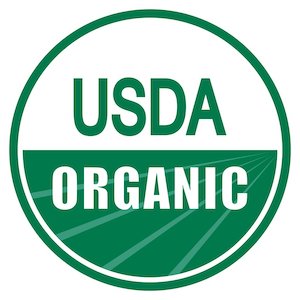 As of 2022, California is still the only U.S. state with its own USDA-approved organic program, the California State Organic Program (CASOP). CASOP’s rules for organic certification are strict, prohibiting common conventional-agriculture substances like glycophosphate, sewage sludge, and GMOs. Soil must be free of such substances for three years prior to harvesting a crop, and thereafter farmed free of artificial chemical pesticides, fungicides, fertilizers, and herbicides.
As of 2022, California is still the only U.S. state with its own USDA-approved organic program, the California State Organic Program (CASOP). CASOP’s rules for organic certification are strict, prohibiting common conventional-agriculture substances like glycophosphate, sewage sludge, and GMOs. Soil must be free of such substances for three years prior to harvesting a crop, and thereafter farmed free of artificial chemical pesticides, fungicides, fertilizers, and herbicides.
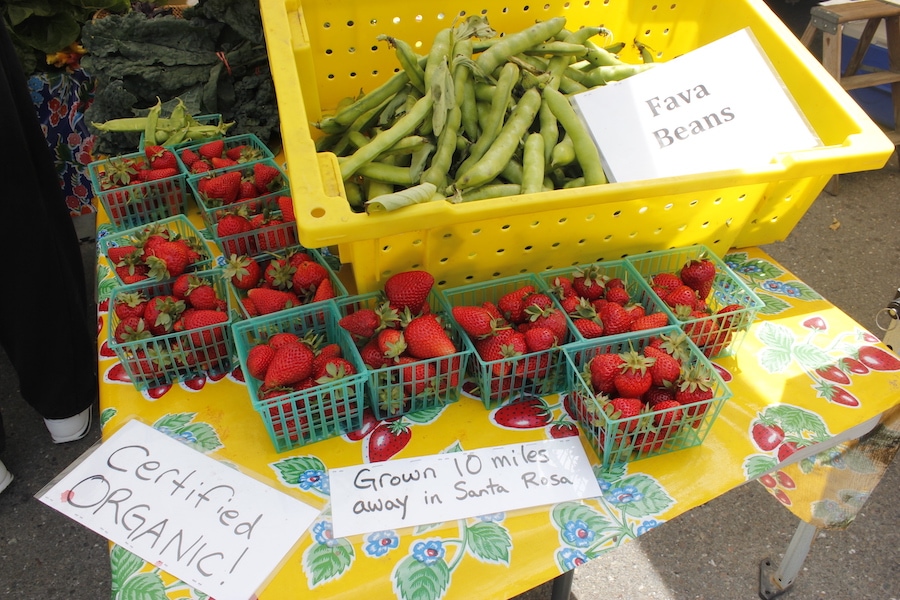
Mineral-based soil amendments (e.g., limestone, gypsum, etc.) are both allowed and encouraged, but copper sulfate — a natural but highly toxic treatment for plant diseases like powdery mildew, for which no natural alternative exists — is approved only when all other options have been exhausted.
Detailed record-keeping of all farm activity is required from the time a landowner chooses to pursue certification and must continue throughout each year of certification. For approval, maintenance, and renewal of certification, these records and the land itself must be reviewed by an NOP-accredited certifying agent. In Sonoma County, all certifying agents are affiliated with CCOF, California’s original organic certification entity.
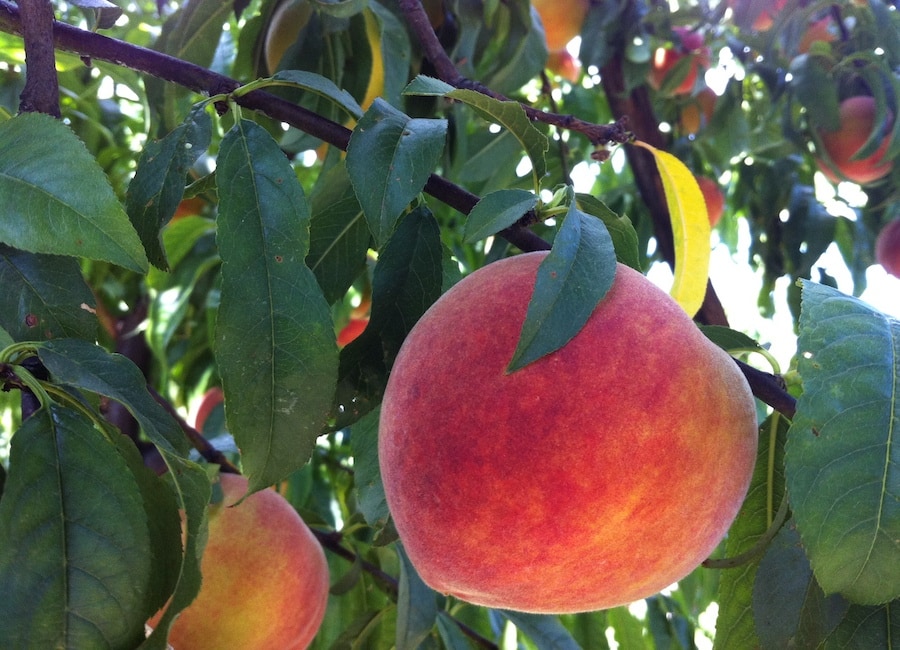
Organic-certified farms in Sonoma County include Boring Farm, Bees N Blooms, Dry Creek Peach & Produce, Front Porch Farm, Quivira Vineyards & Winery, Bartholomew Estate Winery and DeLoach Vineyards.
A Note on Organic Wine Labelling
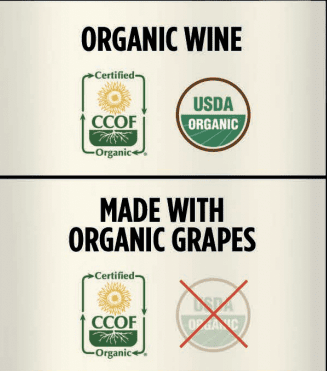 There are two different organic-related terms used on wine labels. The phrase “made with organic grapes” describes a wine made with organically grown or organic-certified grapes, but which also uses sulfites to preserve a wine’s fresh flavors. The phrase “organic wine” denotes wine made with organic-certified grapes, but without the use of sulfites.
There are two different organic-related terms used on wine labels. The phrase “made with organic grapes” describes a wine made with organically grown or organic-certified grapes, but which also uses sulfites to preserve a wine’s fresh flavors. The phrase “organic wine” denotes wine made with organic-certified grapes, but without the use of sulfites.
Biodynamic Farming
The principles of Biodynamic farming are based on Austrian philosopher Dr. Rudolf Steiner’s “Agricultural Course,” an eight-part workshop he created in 1924, using information he professed to have learned during visits to the spirit world. His workshop was designed to inspire European farmers to reject industrialized agriculture and return to a traditional agrarian lifestyle.

These teachings caught on in Europe, and in 1928, Biodynamic authority Demeter International was created with the goals of boosting seed fertility, crop yields, and livestock health.
Biodynamic Certification
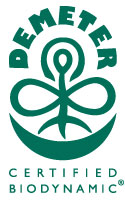 Formed in 1985, the Demeter USA chapter preceded the National Organic Program by 17 years. Biodynamic certification via Demeter USA includes similar guidelines to those of the NOP, but goes even further.
Formed in 1985, the Demeter USA chapter preceded the National Organic Program by 17 years. Biodynamic certification via Demeter USA includes similar guidelines to those of the NOP, but goes even further.
According to Demeter’s Biodynamic Farm Standard, a Biodynamic-certified farm “must be structured so that the waste of one part of the farm becomes the energy for another,” meaning that all solutions for disease, pest, and weed control must be sourced from within the farm.
Tillage of crops and single-crop monoculture planting are forbidden. All aspects of the farm must consider the health of neighboring waterways and native habitats, and a diversity of livestock (or at the very least, one healthy, manure-producing cow) must be present.
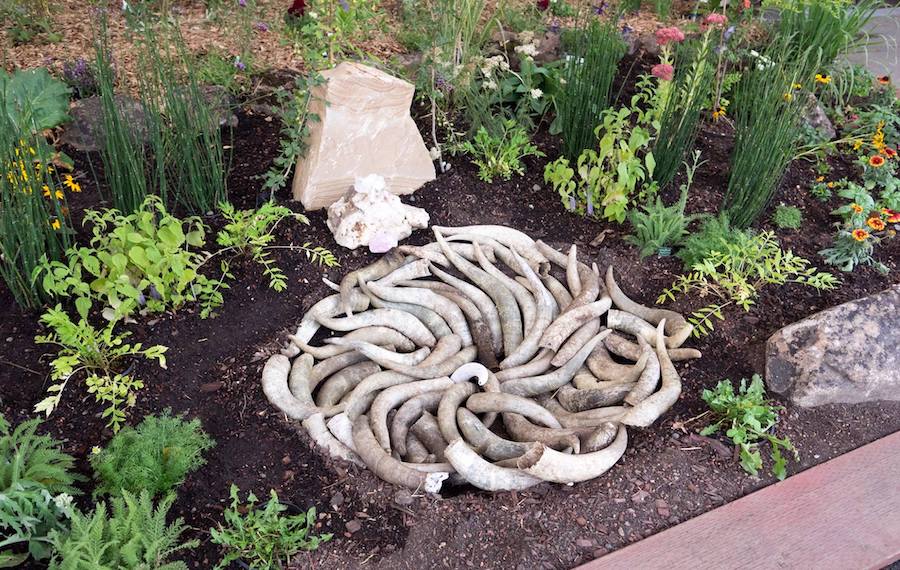
In addition, a Biodynamic-certified farm must utilize nine preparations (designed by Steiner and numbered 500-508) that are made from herbs, flowers, minerals, animal manures and parts, and used, according to the Standards, “in field sprays and compost inoculants and applied in small doses, much like homeopathic remedies are for humans.”
Biodynamic farming also employs its own proprietary calendar, considering lunar, astral, and seasonal cycles when determining when to plant, harvest, and perform other farming tasks in order to achieve the most advantageous results.
If a farm has been certified organic at the time of its application for Biodynamic certification, a conversion period of one year is allowed; otherwise, the farm must undergo a conversion period of three years. Detailed records of all activities on the farm must be kept for five years.
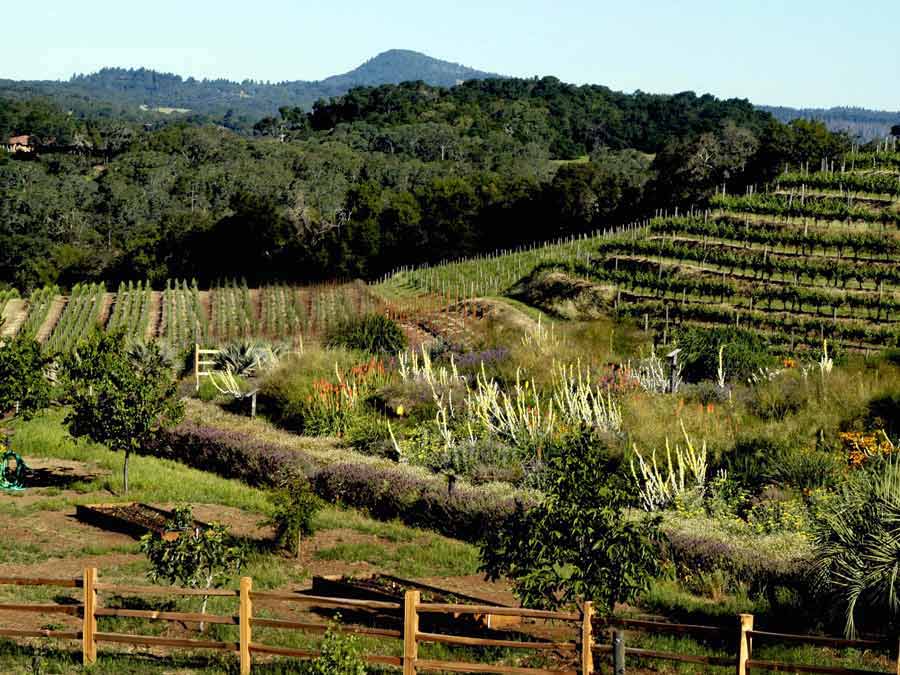
Biodynamic-certified operations in Sonoma County include Benziger Family Winery, DaVero Farms and Winery, Hamel Family Wines, Porter Creek, Mauritson Wines and Truett Hurst Winery.
Sustainable Farming
A flexible ethos that allows both organic and Biodynamic farming practices, sustainable farming has many similar goals as these other two systems: water conservation, air quality and wildlife habitat protection, energy efficiency, restoring and maintaining healthy soils, and responsible pest management.
 However, sustainable farming adheres to the three pillars of sustainability — people, profit, and planet — and therefore also includes a commitment to social and environmental responsibility for workers and the greater community.
However, sustainable farming adheres to the three pillars of sustainability — people, profit, and planet — and therefore also includes a commitment to social and environmental responsibility for workers and the greater community.
Enhancements to farms seeking sustainability can include solar panels, a water recycling system, watershed cleanup efforts, offering employee benefits, and making various improvements (e.g., agricultural, environmental, aesthetic, etc.) to appease neighbors.
If a Sonoma County farm or vineyard wishes to be certified sustainable, there are several certification options from which to choose. Each of these options require the farm/vineyard to create a sustainability plan that includes detailed documentation and reporting on how the operation is complying with the certification’s specific rules.
Sustainable Certification for Sonoma County Farms
Fish Friendly Farming (FFF)
 Run by the non-profit California Land Stewardship Institute since 2004, this program’s main goal is improving the health and numbers of salmonids (salmon and trout) in oceans, rivers, streams, and creeks. Since salmonids are especially sensitive to human-induced impacts (e.g., changes in water quality, quantity, and temperature, etc.) their health is considered an indicator of the overall health of their surrounding environments — which in Sonoma County include many farms.
Run by the non-profit California Land Stewardship Institute since 2004, this program’s main goal is improving the health and numbers of salmonids (salmon and trout) in oceans, rivers, streams, and creeks. Since salmonids are especially sensitive to human-induced impacts (e.g., changes in water quality, quantity, and temperature, etc.) their health is considered an indicator of the overall health of their surrounding environments — which in Sonoma County include many farms.
To safeguard salmonid health, FFF has designed a series of farm management strategies for improving soil erosion, stream bank failure, and water quality degradation; collectively, these strategies comprise their Fish Friendly Farming certification. A farm seeking the FFF certification must implement the required management-practice changes within three years, and any major farm projects (for which FFF will work with the farmer to apply for grants and permits) must be implemented within 10 years.
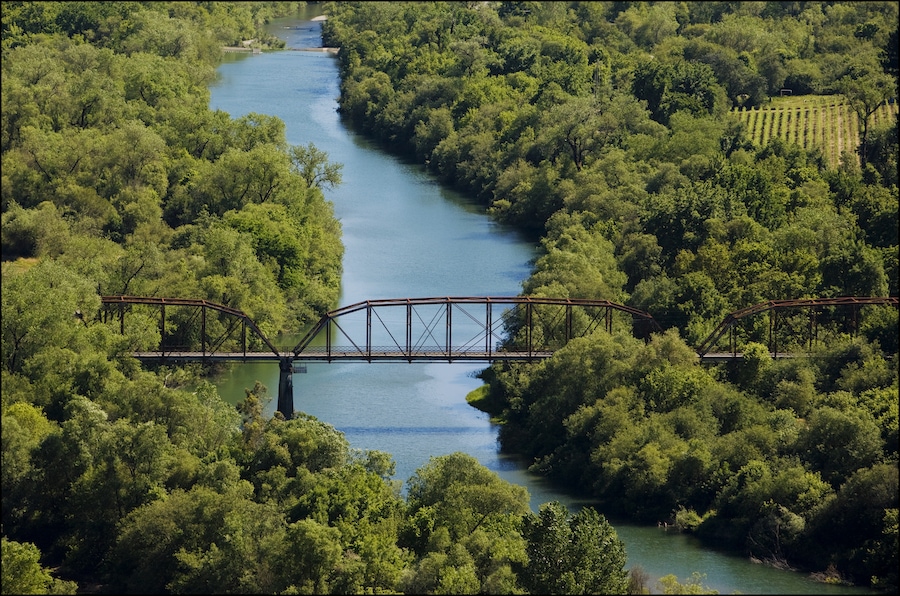
Fish Friendly Farming certifies farmland according to its neighboring watersheds. In Sonoma County, these watersheds belong to the Russian River, Sonoma Creek, and Salmon Creek.
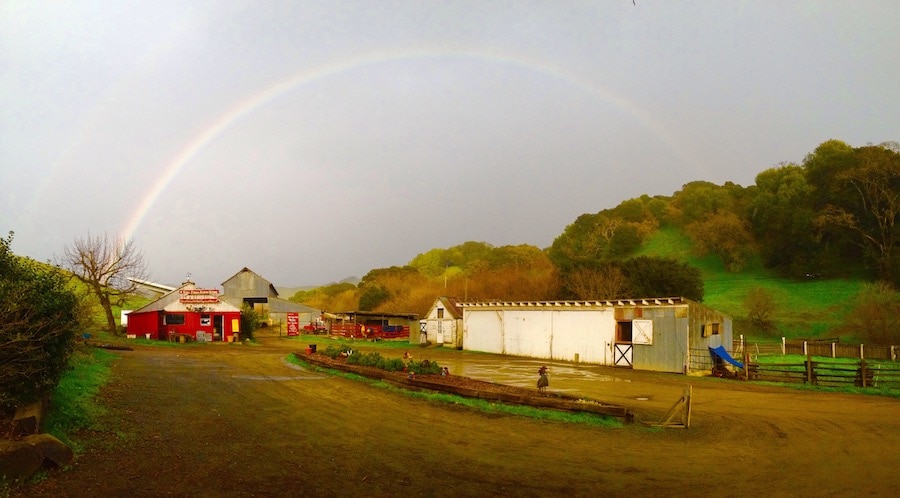
FFF-certified farms in Sonoma County include Tara Firma Farms, Dutton-Goldfield Winery, and the kitchen gardens at Kendall-Jackson Wine Estate and Jordan Winery & Vineyards.
Sustainable Certifications for Sonoma County Vineyards Only
In 2014, Sonoma County Winegrowers (SCW) set the goal of having 100% of its 1,800 winegrower members become certified sustainable by 2020. This has proven a successful initiative, as by the end of 2019, 99% of SCW members had become certified sustainable.
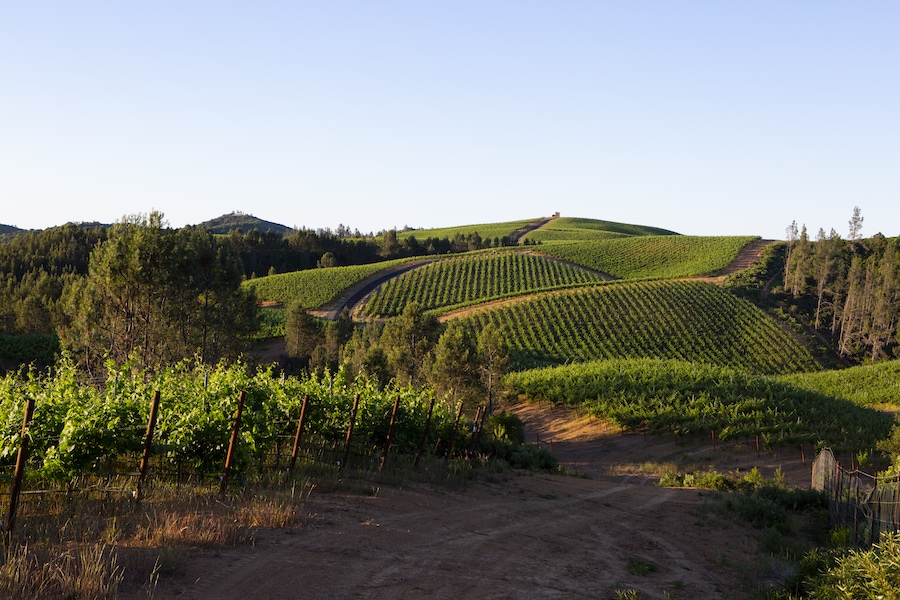
There are several sustainable certifications available to Sonoma County vineyard growers:
Certified California Sustainable Winegrowing (Certified Sustainable)
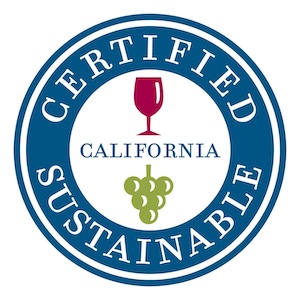 Introduced in 2010 and administered by the California Sustainable Winegrowing Alliance (CSWA), the Certified Sustainable certification evaluates vineyard operations for environmental soundness, economic feasibility, and social equality. The program’s metrics include 140 criteria (ranked on a points system from 1–4) in the conscientious use of water, energy, and nitrogen, as well as reduction of greenhouse gas emissions.
Introduced in 2010 and administered by the California Sustainable Winegrowing Alliance (CSWA), the Certified Sustainable certification evaluates vineyard operations for environmental soundness, economic feasibility, and social equality. The program’s metrics include 140 criteria (ranked on a points system from 1–4) in the conscientious use of water, energy, and nitrogen, as well as reduction of greenhouse gas emissions.
In Sonoma County, Certified Sustainable vineyards include those under the wide umbrellas of E. & J. Gallo, Rodney Strong Vineyards, Treasury Estates, Jackson Family Wines, Constellation, and The Wine Group. Certified wineries include Alexander Valley Vineyards, Chalk Hill Estate, Gloria Ferrer Caves & Vineyards and Hartford Family Winery.
Lodi Rules
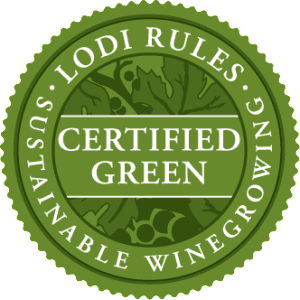 Created by the Lodi Winegrape Commission and nonprofit Protected Harvest in 2005, this sustainable vineyard certification was originally awarded only to vineyard growers in Lodi, California, then expanded throughout California.
Created by the Lodi Winegrape Commission and nonprofit Protected Harvest in 2005, this sustainable vineyard certification was originally awarded only to vineyard growers in Lodi, California, then expanded throughout California.
Vineyard growers seeking certification must meet 70% of 100 program standards in the responsible management of their business, human resources, ecosystem, soil, water, and pests.
Unique to this sustainability certification is the Pesticide Environmental Assessment System (PEAS), a pesticide risk model that generates an Environmental Impact Unit (EIU) for each pesticide used by a vineyard, based on its impact on farm workers, consumers, small aquatic invertebrates, birds, bees, and pests’ natural enemies. Pesticide use by Lodi Rules-certified vineyard growers must fall below 50 EIUs for the growing season.
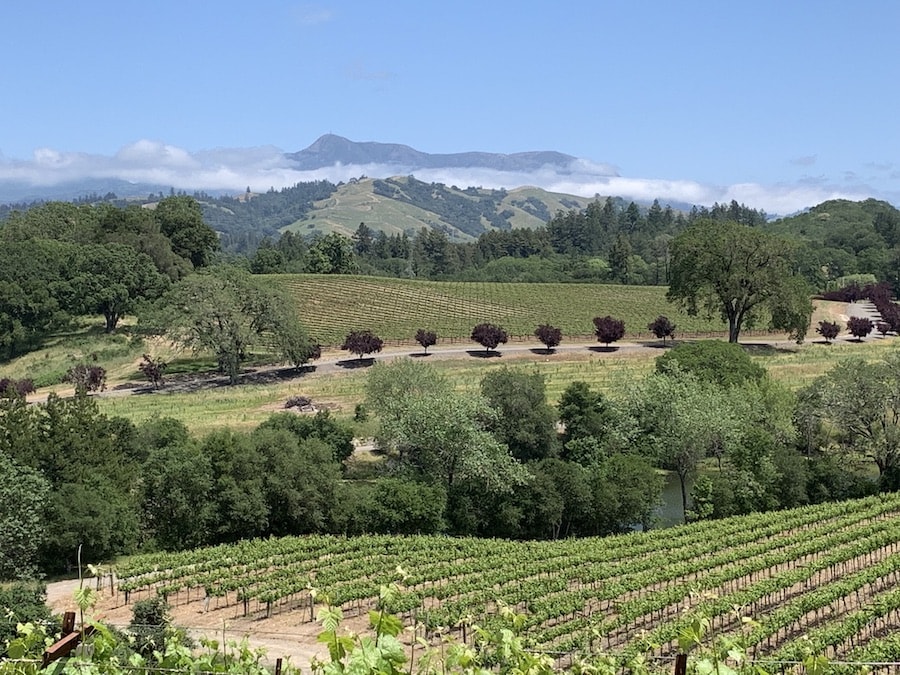
Of the more than 50,000 California vineyard acres that are presently Lodi Rules-certified, more than 2,000 are in Sonoma County, including those at Warnecke Ranch (grape supplier to Sutro Wine Co., among other wineries) and Balletto Vineyards.
SIP Certified (Sustainability in Practice)
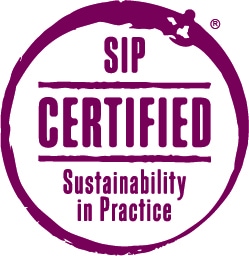 SIP certification evaluates a vineyard’s environmental soundness, economic feasibility, and social equality. A qualifying vineyard needs 75% of the total possible sustainability points, which also include a Prohibited Materials List of various pesticides. Once certified, vineyards must be verified annually through a third party.
SIP certification evaluates a vineyard’s environmental soundness, economic feasibility, and social equality. A qualifying vineyard needs 75% of the total possible sustainability points, which also include a Prohibited Materials List of various pesticides. Once certified, vineyards must be verified annually through a third party.
There are more than 50 SIP Certified vineyards in Sonoma County, including the famed Durrell Vineyard (which supplies Chardonnay to Gary Farrell, Three Sticks, Chateau St. Jean and more), and La Crema‘s own Saralee Vineyard.
Non-Certified Farms in Sonoma County
Though earning an official ecological certification can be a smart move for a farm operation — from inspiring confidence in consumers to attracting positive publicity — there are several reasons why farms (vineyards included) who adopt organic, biodynamic and/or sustainable practices don’t seek them.
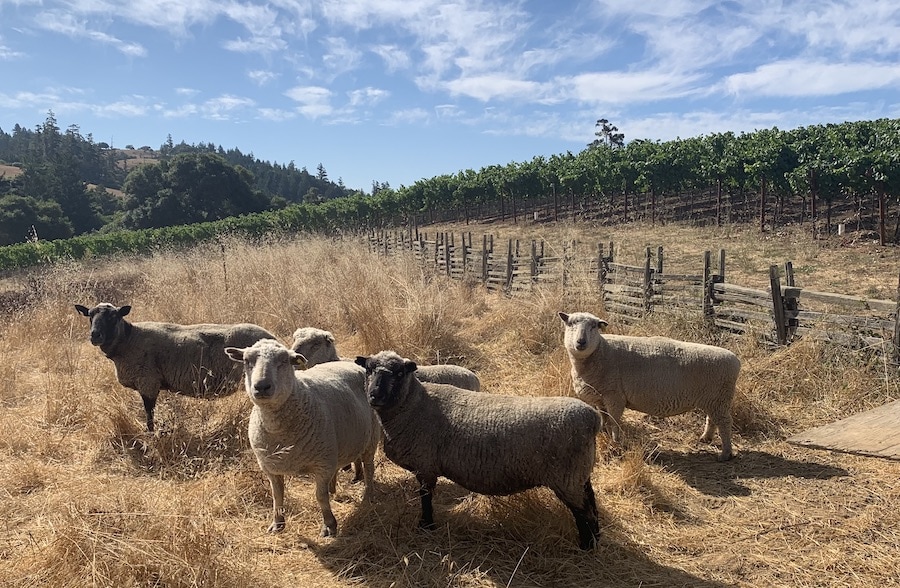
The top two reasons farms don’t pursue ecological certification are:
Cost: Every type of farm certification requires application and inspection fees, which, despite the potential for a farm operation to obtain cost-saving grants, reimbursement programs, and research opportunities, may still be prohibitive for them. Organic certification fees in Sonoma County, for example, range from $700 for a small property to $6,000 for a large one. Biodynamic-certification fees can amount to $1,400, while widely-varying sustainable-certification fees average $500 to apply and $10 per acre for inspections.
Labor: Though busy farm staff might practice eco-friendly farming methods, they might not feel able to prioritize certification, which includes time-consuming actions like creating a detailed farm plan, keeping detailed logs, and bringing large-scale improvement projects to fruition.
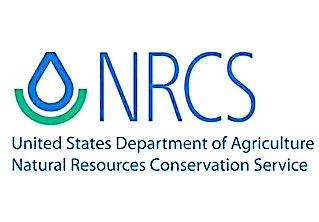 Some farms that employ ecological farming methods are simply motivated by a desire to care for their land and crops, and function as a responsible business and/or community member. Some of these farms may choose to participate in National Resource Conservation Service (NRCS) watershed and conservation programs instead of seeking certifications.
Some farms that employ ecological farming methods are simply motivated by a desire to care for their land and crops, and function as a responsible business and/or community member. Some of these farms may choose to participate in National Resource Conservation Service (NRCS) watershed and conservation programs instead of seeking certifications.
Sonoma County is home to many such eco-friendly yet non-certified farm operations, includingDarling Farms, and Singing Frogs Farm. Good resources for finding such farms are the Sonoma County Farm Bureau, area farmers markets, and Sonoma County Farm Trails.
Written by Melanie Wynne
THIS IS WINE COUNTRY.
Share your experience using #SonomaCounty or #LifeOpensUp

